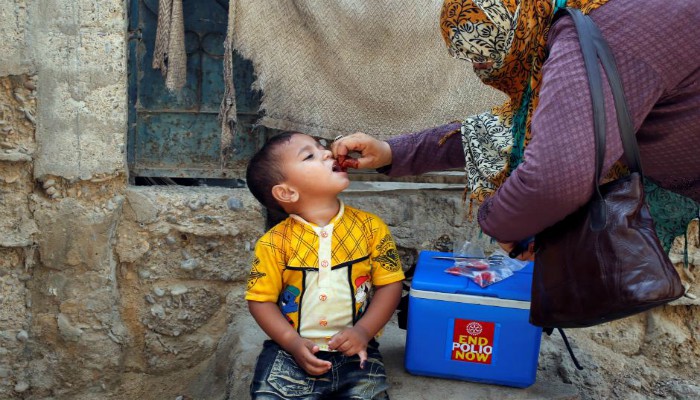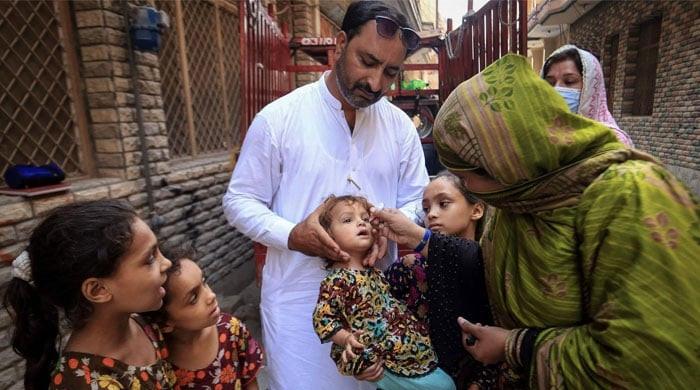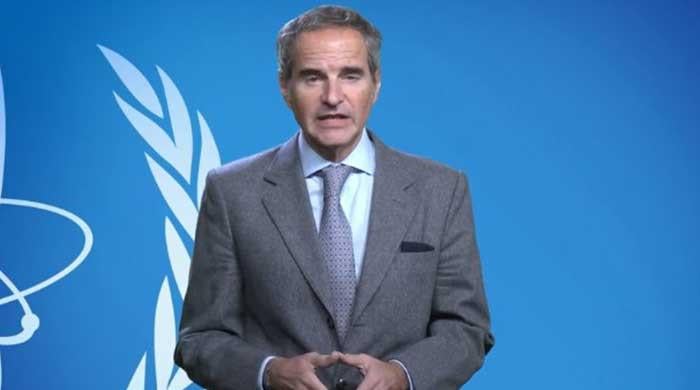Improved security in Pakistan helpful in fight against polio, says WHO
Better security situation has helped campaign against polio – bringing the cases of the virus to a single digit in a country of more than 210 million people.
October 24, 2018

PARIS: The World Health Organisation’s Director of Polio Eradication Michel Zaffran has said that tackling the issue of polio has been made easier because Pakistan’s security forces led a gallant fight against militants and improved security situation in the country.
Better security situation has helped campaign against polio – bringing the cases of the virus to a single digit in a country of more than 210 million people.
At a conference here to mark the World Polio Day organised by Sanofi Pasteur, Zaffran told Geo News that security situation on the side of Afghanistan remains a concern and which has an impact across the border in Pakistan as there is fear that increase in polio cases in Afghanistan could lead to resurgence – and increase – in cases of polio in Pakistan.
He said that Pak-Afghan border is porous and situation in Afghanistan is “less under control”. He said that improved security means that Pakistan has progress, numbers of polio cases are low and “Pakistan is on the right track” but risk factors remain.
The event, held at Rue La Boétie, was attended via web links by experts from Africa, Asia, and Europe on the question of whether now is the time to stop polio eradication effort. Shahnaz Wazir Ali and Aziz Memon from Pakistan attended the discussion and provided updates from Pakistan.
When asked about the arrest of Shakil Afridi in Pakistan and the resultant issues, Zaffran said that a lot of positive discussion took place in Pakistan and awareness was raised after mobilisation at big scale. He said that progress in fight against polio is possible with help from the people and “we are on track”.
He said that the targets achieved have been extraordinary and bringing polio to under single digit was no small task but it also means that “we still have to achieve a lot, together”.
David Loew, head of Sanofi Pasteur, said that the WHO is getting close to polio eradication with help from volunteers and international partners. He said polio is a dangerous disease which cripples children, puts them at disadvantage and kills many.
Loew added that the WHO had done a lot of work in achieving the targets. He said that his organisation and partners were committed to using everything in their power to ensure that campaign against polio continues.
Dr Roland Sutter, coordinator for polio research, policy and containment at the WHO, said that there is need to repeat vaccination over and over again. He said that polio workers battled challenges in many parts of the world and faced issues of various kind. He said in many communities help of religious leaders have been sought to explain the importance of vaccination to local communities.
Sutter added that previous Pakistani governments provided full support to the WHO and now Imran Khan’s government has expressed full commitment in fight against polio. He said that Prime Minister Imran Khan has appointed Babar Bin Atta as a focal person to deal with the issue of polio, who will work as bridge between the government and aid agencies to ensure that the effort against polio remains on track.
“Babar Bin Atta knows the issue well and has experience in the relevant area. He will provide link between political and technical sides. He will make sure action is taken as needed at political level to highlight these issues. PM Khan has made strong statements to continue making efforts to make Pakistan polio free,” he said.
Dr Sutter said that recently two workers were killed in Quetta but “thankfully the Pakistani government increased the security of frontline workers ensuring that they are protected. In Afghanistan, polio volunteers can be the victims of bombings and attacks and attacks could also target people near and around them. There are sometime collateral victims. In Pakistan, security forces protect polio workers.”
He mentioned that situation in Pakistan has turned around a great deal from a point where people hid their children and didn’t like the idea of vaccination to now people understanding that vaccinating their children is good for them and will save their children from diseases.
“Now people trust us and let us administer polio, religious leaders and media played a big role and people are cooperating with us. Now polio cases remain only in Nigeria, Pakistan and Afghanistan."









